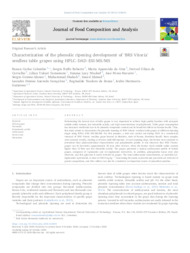Characterization of the phenolic ripening development of "BRS Vitoria" seedless table grapes using HPLC-DAD-ESI-MS/MS.
Characterization of the phenolic ripening development of "BRS Vitoria" seedless table grapes using HPLC-DAD-ESI-MS/MS.
Author(s): COLOMBO, R. C.; ROBERTO, S. R.; CRUZ, M. A. da; CARVALHO, D. U. de; YAMAMOTO, L. Y.; NIXDORF, S. L.; PEREZ-NAVARRO, J.; GÓMEZ-ALONSO, S.; SHAHAB, M.; AHMED, S.; GONÇALVES, L. S. A.; SOUZA, R. T. de; HERMOSÍN-GUTIÉRREZ, I.
Summary: Determining the harvest date of table grapes is very important to achieve high-quality bunches with adequate soluble solids content, low titratable acidity, and high concentrations of polyphenols. Table grape consumption has increased worldwide due to its phenolic compound content and its beneficial effects on human health. Thus, this study aimed to characterize the phenolic ripening of ?BRS Vitoria? seedless table grapes at different ripening stages using HPLC?DAD?ESI-MS/MS. For this purpose, a trial was carried out during 2016 in a commercial vineyard of ?BRS Vitoria? seedless grape located in Marialva, state of Parana (Southern Brazil). Berry samples were assessed weekly, starting at v ́eraison until full ripeness. At each ripening stage, the berries were analyzed to determine their physicochemical characteristics and polyphenolic profile. It was observed that ?BRS Vitoria? grapes can be harvested approximately 28 days after v ́eraison, when the berries reach soluble solids content higher than 15◦Brix and low titratable acidity. The grapes presented a typical anthocyanin profile of hybrid grapes, composed of 3-glucoside and 3,5-diglucoside derivatives. In addition, pelargonidin traces were also observed, and this aglycone is rarely detected in grapes. The total anthocyanin concentration, as malvidin-3,5- diglucoside equivalents, is close to 596.9 mg kg
Publication year: 2020
Types of publication: Journal article
Unit: Embrapa Grape & Wine
Keywords: Anthocyanin, Flavonoids, Harvest date, Hybrid grapes, Maturation, Polyphenolic profile
Observation
Some of Embrapa's publications are published as ePub files. To read them, use or download one of the following free software options to your computer or mobile device. Android: Google Play Books; IOS: iBooks; Windows and Linux: Calibre.
Access other publications
Access the Agricultural Research Database (BDPA) to consult Embrapa's full library collection and records.
Visit Embrapa Bookstore to purchase books and other publications sold by Embrapa.

